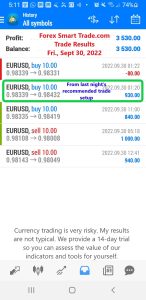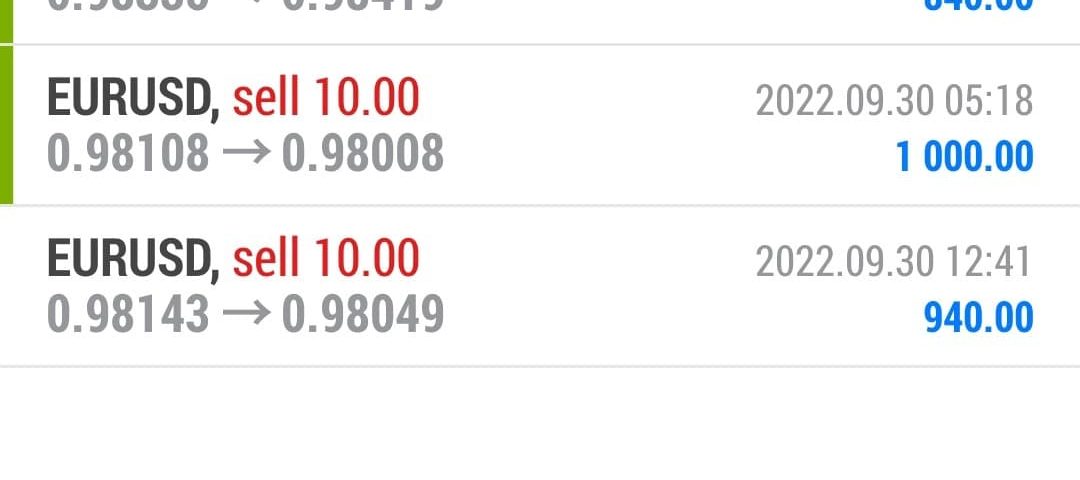Forex Smart Trade Results September 30, 2022 – $3,530

Forex Smart Trade Results September 29, 2022 – $5,910
September 29, 2022
Forex Smart Trade Results October 4, 2022 – $7, 533
October 4, 2022Understanding Retail Forex Trading.
Let’s continue our discussion on understanding retail forex trading.
I may inform you the quotes that your forex broker provides you by or even come directly from the institutional FX market (via price feeds), but it is your broker who you are still trading against.
Nobody else.
Why is this important to know?
Since the broker is the one taking the opposite side of your trade, this creates a potential conflict of interest.
How?
If your trade makes money, your broker loses money. And if you lose money trading, your broker makes money on the trade (plus any other fees it may charge).
So from your broker’s perspective, it’s in their interest if your trades lose money (which conflicts with your interest since you want your trades to make money).
Notice how we mentioned a “potential” conflict of interest. “Potential” is used because there are ways to mitigate this conflict between you and the broker.
This will be discussed in more detail in a later lesson but what’s important to know for now is that the potential conflict of interest does exist.
Counterparty Risk in Forex Trading
Because your broker is your sole counterparty, this means that there is the risk that it might not meet its obligations to you.
We know this as counterparty risk.
A counterparty is the other party that participates in a transaction, and every transaction must have a counterparty in order for the transaction to go through.
We also know the buyer and seller in a transaction as counterparties.
- The buyer is the counterparty to the seller.
- The seller is the counterparty to the buyer.
A counterparty is the other party that participates in a transaction, and every transaction must have a counterparty in order for the transaction to occur.
Regarding trading, a counterparty is simply the other side of a trade. For example, a buyer is a counterparty to a seller.
Principals
You (the buyer) and the seller (the forex broker) are known as “principals”.
A principal is a party involved in a contract.
So as the buyer, you are a principal. And as the seller, the forex broker is also a principal.
You trade as principal. And your broker trades as principal.
When you trade with each other, it’s known as “principal-to-principal” trading.
This is why a forex broker is not really a forex “broker” but a forex “dealer“.
A broker is supposed to act as an agent on your behalf who simply ”brokers” a deal between you and another counterparty (principal).
Or in other words, matching your order with a buyer/seller.
So by definition, a forex broker can NOT be a true broker because it IS your counterparty since it takes the other side of the transaction as principal.
Counterparty Risk
Counterparty risk, also known as default risk or counterparty credit risk (CCR), is the risk that a counterparty will not pay as obligated on a contract.
For example, if two people agree to trade, and there is no one else to verify the trade.
It is possible that one party could back out of the agreement, or be unable to produce the funds to hold up their end of the transaction.
If you open a position with your broker and then close it for a profit.
What happens if the broker doesn’t have the money to pay out your winning trade?
What if other traders opened a similar position as you, where they all also ended up with a profit?
The aggregate profit from all these trades results in the broker having such an enormous loss that it “goes bust.”
And doesn’t have the capital (money) to honor the winning trades.
Since the position was a transaction between you and the broker, and you can’t move or transfer the position with another broker, YOU ARE SCREWED.
Let’s repeat that again for emphasis.
When you win, your counterparty loses.
If your counterparty, your broker, is unable or unwilling to fulfill its obligations upon losing a trade, YOU ARE SCREWED.
Are you worried yet?

Learn to Day Trade Forex
If you’d like to earn extra income trading on the Forex market, consider learning how to currency trade with Forex Smart Trade. With their super-accurate proprietary trading tools and best-in-the-business, personalized one-on-one training, you’ll be successful. Check out the Forex Smart Trade webinar. It shows one of their trader’s trading and how easy, intuitive, and accurate the tools are. Or try the Forex Smart Trade 14-day introductory trial for just TEN dollars.


